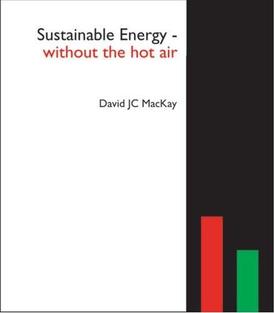
David JC MacKay's Sustainable Energy – Without the Hot Air may be the best technical book about the environment that I've ever read. In fact, if I have any complaint about this book, it's in how it's presented, with its austere cover and spartan title, I assumed it would be a somewhat dry look at energy, climate, conservation and so on.
It's not. This is to energy and climate what Freakonomics is to economics: an accessible, meaty, by-the-numbers look at the physics and practicalities of energy. MacKay, a Cambridge Physics prof, approaches the subject of carbon and sustainability with a scientific, numeric eye. First, in a section called "Numbers, not adjectives," he looks at all the energy and carbon inputs and outputs in Britain and the rest of the world: this is how many kWh of energy are needed to power all of Britain's vehicles. This is how many kWh you would get if you covered the entire British shore with windmills, or wave-farms. This is Britain's geothermal potential. Here's how much carbon vegetarianism offsets. Here's how much carbon unplugging your idle appliances saves (0.25%, making the campaign to switch off energy vampires into a largely pointless exercise — as MacKay says, "If everyone does a little bit, we'll get a little bit done"). This is the carbon-footprint of all of Britain's imports, gadgets, office towers, and so on.
Using a charming, educational style that teaches how to think about this kind of number, how to estimate with it, and what it means, MacKay explains these concepts beautifully, with accompanying charts that make them vivid and clear, and with exhaustive endnotes that are as interesting as the text they refer to (probably the best use of end-notes I've encountered in technical writing — they act like hyperlinks, giving good background on the subjects that the reader wants to find out more about while allowing the main text to move forward without getting bogged down by details).
Next, in "Making a Difference," looks at what it would take to balance Britain's (and, eventually, the world's) energy budget so that the consumption is sustainable (that is, so that it uses only renewables or fuels that would last for 1000 years — and emits so little carbon that we avert a 2C' rise in global temperature). He looks realistically at conservation, considering the theoretical limits on efficiency for rail, electric cars, air, as well as factories, home design and so forth, giving examples ranging from better insulation to tearing down all the housing in Britain and rebuilding it for maximum efficiency (factoring in the energy and carbon costs of the new building, of course).
This chapter also has a lot of sensible personal advice for things you can do to reduce your energy consumption — especially identifying those few badly designed devices in your home whose idle power-draw really is punitive and replacing them (one Ikea lamp he cites draws nearly as much switched off as running, because of a transformer design that was one penny cheaper to manufacture than a more efficient one would have been).
Finally, in a long technical appendix, MacKay delves into the physics of maximal performance in transport, manufacturing, housing and energy generation, explaining it in a way that I — who have not studied physics since I was 18 — was able to follow.
This reminded me of nothing so much as Saul Griffith's wonderful talk on climate change as an engineering problem. Add up all the energy we can make if we harness every erg, every photon. Subtract all the energy we want to use. Examine this difference and come up with strategies for bringing the two into balance. Once you get this approach, it becomes a lot simpler to figure out what is and isn't worth doing.
My only complaint about this book is its packaging: if it were tarted up to look like the transformative, important popular science book that it really is, I think it would be at the center of the environmental debate today.
The entire book is available as a free 10MB PDF download so you can start reading immediately
Sustainable Energy – Without the Hot Air (US)
Sustainable Energy – Without the Hot Air (UK)
Without Hot Air — MacKay's site for the book, including the whole book as a free download





